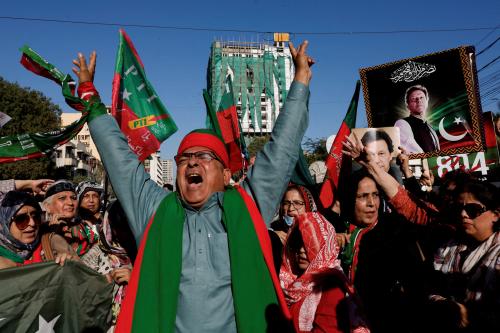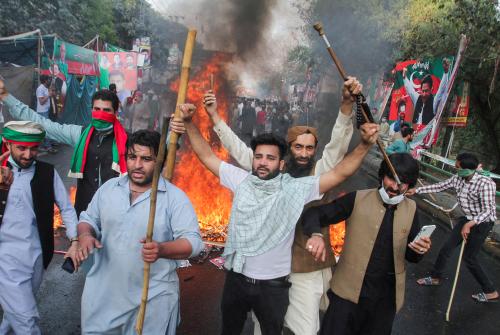Pakistan has a new government in power. The country held a delayed, flawed election on February 8, 2024, marked by a pre-poll crackdown on its most popular political party, the Pakistan Tehreek-e-Insaf (PTI), arrests of thousands of PTI members and senior leadership, and knocking the party name and election symbol off the ballot. Election day was marred by internet and cell service shutdowns. Voters showed up and cast their ballots anyway, but an unexplained delay in the result and reported discrepancies in vote tabulations further mired the election in controversy. Behind it all was the military’s usual playbook of propping up the party it favors, and stacking the deck against the party it does not.
U.S. President Joe Biden’s administration, which has effectively downgraded the relationship with Pakistan, was conspicuously silent on the pre-poll manipulation leading up to the election. Biden has neglected Pakistan for the past three years—not calling the Pakistani prime minister even once—while the State Department has continued to engage with the country, trying to find a new basis for the relationship which floundered after the end of the U.S. war in Afghanistan. The day after the election, the State Department did acknowledge concerns about “allegations of fraud in the electoral process,” and called for claims of interference to be fully investigated.
A significant number of members of Congress and the chairs of the Senate and House Foreign Relations committees followed suit with their own statements, some considerably stronger than the State Department’s. In late February, 31 members of Congress sent a letter to the Biden administration calling on it to withhold recognition of the new government “until an investigation determines the election was not rigged.”
Official statements from other countries were also more pointed about Pakistan’s election day irregularities and specific about pre-poll manipulation. U.K. Foreign Secretary David Cameron, for instance, expressed “regret that not all parties were formally permitted to contest the elections and that legal processes were used to prevent some political leaders from participation.”
Neither the State Department nor the White House issued an official statement congratulating the new government, but the U.S. ambassador to Pakistan, Donald Blome, congratulated Pakistani Prime Minister Shehbaz Sharif soon after Sharif took his oath of office, and he has engaged with both him and the new president, Asif Zardari. On March 29, Biden wrote a short note to Sharif about the “enduring partnership” between the two countries, the first official outreach from Biden to a Pakistani prime minister since 2021.
A congressional hearing on March 20 focused on Pakistan’s elections and the future of its democracy. In his testimony, Donald Lu, assistant secretary of state for South and Central Asia, pointed to the Election Commission of Pakistan’s (ECP) investigation of election irregularities and noted that the ECP had previously held new elections in cases where irregularities were found. The State Department’s faith in the ECP is misplaced this election cycle: The organization has failed on multiple instances to fulfill its constitutional duties and has appeared partisan. In response to a question about what would happen to the U.S.-Pakistan relationship if the ECP failed to properly investigate irregularities, Lu noted that relations would be negatively affected. The history of the U.S.-Pakistan relationship tells us that is unlikely.
The Pakistani army and America
The Biden administration claims that democracy at home and abroad is a key focus. Yet, it has largely dropped the ball when it comes to Pakistan’s democracy. The U.S. administration’s tepid stance on the subversion of Pakistan’s democratic process in this election cycle belies more than a lack of interest: it reflects the very nature of the U.S.-Pakistan relationship. Pakistan’s army has long been America’s partner of choice in the country, through periods of both military and civilian rule.
Pakistan’s army has long been America’s partner of choice in the country, through periods of both military and civilian rule.
America has arguably been closest to Pakistan’s military dictators, from General Ayub Khan in the 1960s to General Zia-ul-Haq in the 1980s and General Pervez Musharraf in the early 2000s. Part of the story is the decades-long American involvement in Afghanistan. In the 1980s, Pakistan partnered with America covertly to support the mujahideen in the Soviet-Afghan war. After 2001, Pakistan allied with U.S. President George W. Bush’s administration as it began the war in Afghanistan, receiving $23 billion in security aid and military reimbursements until 2018. The two militaries continue to join hands on counterterrorism concerns.
America’s partnership with Pakistan’s military is also a product of U.S. anxieties about Pakistan’s stability and the fear that its nuclear arsenal might fall into the wrong hands. Pakistan’s military projects itself as the most competent institution in the country to both domestic and foreign audiences, and America has internalized that notion. U.S. support to Pakistan’s military—both financial and non-financial—has in turn cemented the army’s strength.
Yet America’s belief in the military as the guarantor of stability in Pakistan has hardly borne out. In the last two years, the military has generated the worst political crisis Pakistan has faced in decades.
In the past the Pakistani army’s conduct has also been a cause of great frustration for the United States. America has long alleged that the army played a double game in Afghanistan by providing the Afghan Taliban sanctuary in Pakistan after 2001, to try to achieve an elusive “strategic depth” in Afghanistan—a friendly government in its western neighbor, to counter a foe to the east in India. That policy has also hurt Pakistan’s own citizens: since the Taliban takeover of Afghanistan, Pakistan once again faces a serious security challenge from the Pakistani Taliban, who have sanctuary and a logistical base across the border in Afghanistan.
Yet America still relies on the Pakistani army, especially on counterterrorism concerns in Afghanistan and the region. While America’s relationship with Pakistan’s civilian government has seen a downgrade during the Biden administration, the relationship between the two militaries has remained intact and strong. Pakistan’s current army chief visited the United States in December, and met U.S. Secretary of State Antony Blinken and U.S. Secretary of Defense Lloyd Austin, among other civilian officials.
The PTI’s leader Imran Khan baselessly and repeatedly blaming the United States for his April 2022 ouster has also not won him friends in Washington.
America’s closeness with Pakistan’s military may explain why it stayed silent on the military’s use of its usual playbook to influence the country’s elections this year—even as the crackdown on the PTI grew more intense and thousands of the party’s members were imprisoned last summer. The PTI’s leader Imran Khan baselessly and repeatedly blaming the United States for his April 2022 ouster has also not won him friends in Washington.
Supporting Pakistan’s democracy
The Biden administration has spoken out more strongly in the case of flawed election processes in countries other than Pakistan. For instance, for Bangladesh, which held a problematic election a few weeks before Pakistan’s, the State Department noted that it “shares the view with other observers that these elections were not free or fair and we regret that not all parties participated.”
The United States also made a stronger statement after Pakistan’s flawed 2018 election, in which the deck was stacked against Sharif’s PML-N party but all political parties were permitted to participate with their party names and symbols (in contrast to 2024). The Trump State Department noted “unequal campaign opportunities” and that “the United States shares concerns about flaws in the pre-voting electoral process, as expressed by the Human Rights Commission of Pakistan.”
For the sake of Pakistan’s democracy (and for the sake of its own credibility), the United States must speak out more forcefully about the military’s undue interference in Pakistan’s electoral process and its other attempts to subvert its democracy. The U.S. government deflecting to Pakistan’s Election Commission or its judicial process is meaningless when those institutions often function as an accessory to the military, as they have this election cycle. A strong American stance on Pakistan’s democracy and its elections may well begin to change the Pakistani military’s usual playbook, because it derives a measure of legitimacy from American support.
Pakistani voters put their faith in democracy in 2024, but they were yet again relegated to voting in the margins of the constraints the country’s military establishment had drawn for them. The Biden administration missed an opportunity this election cycle. The United States should not do so in the future.




Commentary
Pakistan’s democracy, its military, and America
April 3, 2024